Common Home Water Test Kit MISTAKES To AVOID
Common Home Water Test Kit MISTAKES To AVOID
Home water test kits are generally safe and effective to use. However, there are some common mistakes that most people make when using them.
![]() Not storing the water test kit properly. Most test kits need to be stored in the correct way in order for them to be at their most effective. For instance, exposure to extreme temperatures, can affect the accuracy of the test kit. It is always best to follow the manufacturer’s storage recommendations.
Not storing the water test kit properly. Most test kits need to be stored in the correct way in order for them to be at their most effective. For instance, exposure to extreme temperatures, can affect the accuracy of the test kit. It is always best to follow the manufacturer’s storage recommendations.
![]() Using expired test kits, which can lead to inaccurate results.
Using expired test kits, which can lead to inaccurate results.
![]()
Accidentally contaminating the test kits with unwashed hands or rinsing it with tap water before using it.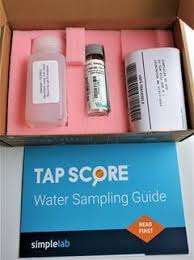
![]() Not carefully following the instructions provided with the test kit. Mistakes in the testing process can result in inaccurate readings.
Not carefully following the instructions provided with the test kit. Mistakes in the testing process can result in inaccurate readings.
![]() Not checking if the kit is suitable for the specific parameters / contaminants that you want to test. For instance, there are specific tests for things like hard water, lead or well water.
Not checking if the kit is suitable for the specific parameters / contaminants that you want to test. For instance, there are specific tests for things like hard water, lead or well water.
![]() Buying the cheapest water test kits or strips. These are no where near as accurate as home laboratory testing kits where you simply mail in your water sample and get your results online a few days later.
Buying the cheapest water test kits or strips. These are no where near as accurate as home laboratory testing kits where you simply mail in your water sample and get your results online a few days later.
While these tests are usually the most expensive they are also the most detailed, comprehensive and accurate.
Water Testing Kit Buying Guide
Which Contaminants Do You Want To Test For?
Even the most comprehensive water testing kits will not be able to detect every single kind and variety of contaminant.
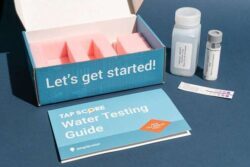 You will have to decide upfront what you need to test for and then get the specific test to detect that.
You will have to decide upfront what you need to test for and then get the specific test to detect that.
There are a wide variety of water testing kits that will check for a specific number (or combination) of common contaminants.
The most common substances of interest are things like iron, chlorine, lead, fluoride, the level of water hardness and pH.
The more contaminants are test is able to detect, the more expensive it will be.
This is why it will be much cheaper if you already know which specific substance you are testing for.
Which Testing Procedure Is Better?
 Neither because it depends on what you need. Your main water test options are:
Neither because it depends on what you need. Your main water test options are:
![]() Home test strips / drops.
Home test strips / drops.
![]() Sending off your water samples to a laboratory for a more accurate analysis and receiving the results online.
Sending off your water samples to a laboratory for a more accurate analysis and receiving the results online.
If you have a small budget and don’t need detailed accurate results then cheap home test kits will be sufficient.
However, if accuracy is a priority then you should consider a home kit that you send out to a laboratory testing facility.
This option is far more comprehensive.
What Is The Water Source?
Are you testing tap water, swimming pool or well water?
You can save money by getting a different type of test depending on what type of water you will be testing.
This is because there are many water test specifically designed to treat specific types of water. For instance, many companies offer a well water test kit package.
Complete Water Analysis Test Kit
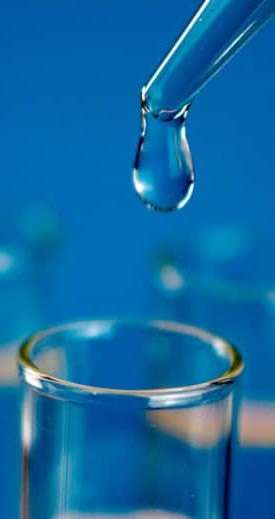 The most complete water analysis you can get is from a laboratory and there are many such labs across North America.
The most complete water analysis you can get is from a laboratory and there are many such labs across North America.
Once you receive the sample collector, take a sample of your water and mail it in. Your results will be posted online within a few days.
Because these tests are performed in a lab, you can have full confidence in the quality of analysis and results.
![]() A full and comprehensive water analysis test kit is on the pricey side but it is by far the most effective way to get the most in-depth water testing that you can rely on.
A full and comprehensive water analysis test kit is on the pricey side but it is by far the most effective way to get the most in-depth water testing that you can rely on.
It will also be worth the investment if it helps you select the right water filters for your home.
And whole house water filters can cost thousands of dollars so this is not something you want to get wrong.
Expert Buying Tip:
“It is possible to get free water test results if you receive your water from a community water supplier. All you need to do is contact the water utility supplier and ask them for a full water analysis report. This is usually supplied for free if it is a public water supplier. You can then use this as a benchmark to test your water against. It will also help you know what to test for or what contaminants you need to focus on.”
Professional Water Test Kit
For one of the most comprehensive water testing kits on the market, consider getting a heavy duty test kit. These are the kind of kits typically used in factories and for industrial purposes.
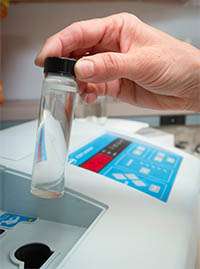 They are extremely thorough but also very expensive.
They are extremely thorough but also very expensive.
An alternative to this is a mail-in comprehensive water testing kit performed by a professional laboratory. These are also very expensive.
However, getting this means you don’t need to own and store large bulky testing equipment.
So this option is good for anyone that only wants to perform the test one time before they decide on which filter option to buy.
![]()
 The Extended PLUS water tests will sample and screen over 100 different contaminants and provide you with an in-depth analysis. This includes heavy metals, bacteria, fungi, algae, VOC’s and much more.
The Extended PLUS water tests will sample and screen over 100 different contaminants and provide you with an in-depth analysis. This includes heavy metals, bacteria, fungi, algae, VOC’s and much more.
One of the major benefits of using this type of service is that they don’t just analyse your water, they provide advice too.
Hard Water Test Kits
Most people have hard water.
Having “hard water” means you have a higher level of calcium and magnesium deposits in your water. The result of this is white limescale stains around your pipes, faucets and plumbing. These stains are almost impossible to clean without using chemicals.
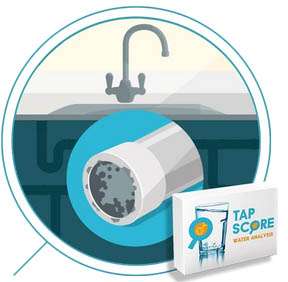 Hard water is also what is responsible for the white flakes at the bottom of your kettle.
Hard water is also what is responsible for the white flakes at the bottom of your kettle.
There are two main ways to deal with this:
A regular salt based softener: This machine is what you need for very hard water. It will require salt and is the only guaranteed way to produce soft water. E.g something like this.
A salt free softener / water conditioner: This doesn’t use salt but can effectively treat a lower amount of water hardness. For example, Aquasana can only effectively treat up to 25 ppm of water hardness.
The only way to know which one to get is to do a water hardness test.
 Water hardness test kits are also a good idea if you’re not sure if your softener is working properly. Knowing one way or the other will let you know if you need to take other precautions to treat your water.
Water hardness test kits are also a good idea if you’re not sure if your softener is working properly. Knowing one way or the other will let you know if you need to take other precautions to treat your water.
Having hard water over a long period of time in the home is very bad for appliances like your heater, washing machine, dishwasher and so on. So a hard water test and subsequent softener solution is really worth the investment.
Well Water Testing Kit
These types of tests are necessary if you have well water. This is because well water has very specific issues that you need to check for.
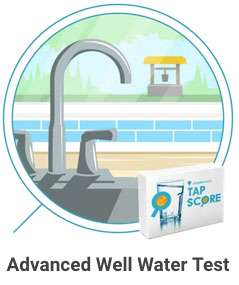 “It is even more important to do a well water test because the EPA does NOT regulate private wells.”
“It is even more important to do a well water test because the EPA does NOT regulate private wells.”
For instance, well water is typically full of things like manganese, nitrates, bacteria, hydrogen sulfide and iron.
You can get a full well water test kit that will check for all of these contaminants and more. And it will do this in one go.
This will give you the peace of mind that you need because it will test for everything that is most likely to be in your water including things you might not expect.
 Past customers of this service talk about how this well water test kit is straightforward, simple to use and the laboratory result turn around time is very fast.
Past customers of this service talk about how this well water test kit is straightforward, simple to use and the laboratory result turn around time is very fast.
These results are reliable, come with a full analysis and advice.
Lead Water Test
Lead is something that a lot of people fear and for good reasons.
It is associated with lots of terrible health issues that include things like anemia, brain and kidney damage. It is also very bad for pregnant women because it can penetrate the placental barrier and directly affect the baby.
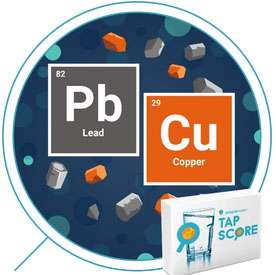 Very high lead exposure can kill you.
Very high lead exposure can kill you.
The scandal of Flint Michigan has created more awareness of the issues around lead contamination.
In addition to this, there are many other types of heavy metals which create equally bad health concerns. For instance, water can be contaminated with copper or mercury.
The EPA (Environmental Protection Agency) has a suggested limit of 15 ppb (parts per billion) of how much lead can be present in US municipal water supplies.
 So it’s a good idea to check to see if the lead in your water is below the 15 ppb threshold.
So it’s a good idea to check to see if the lead in your water is below the 15 ppb threshold.
If it’s higher than this the investment for getting a lead in water test was worth it as it would have prevented you and your family from many potential future health problems.








I hope I’m not being dim, but I can’t find any info on this site re tabletop distillers.
Many seem to regard distilled water as “dead water”.
It feels (to me) “dry” when tasting, and whilst I don’t actually enjoy drinking it plain, my partner does.
There is info on distilled water on Andrew Norton Webbers site, if anyone is interested.
When I test my distilled water with a TDS meter, it always comes out the best over tap, or bottled.
When the water has completed it’s distilling cycle, after cooling down I clean the distiller.
I can see that the bottom of the distiller has turned brownish in colour, and there are white deposits on the walls of the distiller.
I use white (clear) vinegar to clean, and after leaving for a few hours, the vinegar is no longer clear, and I feel glad not to have drunk the tap water before distilling.
For tap water is there a standard good result that doesn’t look perfect? Someone in my town shared results from a home test kit that goes from yellow to red.. yellow being good and got pink. I’m wondering if pink is common like a standard good color?
Where does the metals and flouride go after berkey filtration? One would think the buildup would contaminate everything. And yes, I have changed filters. I’m thinking I should just boil my water, and create a distillery.
Hi Patrick
The filter traps contaminants like metals and fluoride, and keeps it away from your drinking water but the buildup over time are why filters need to be changed.
However, you may need to change the filters more frequently or get something more powerful (e.g. a whole house filter) if your water is heavily contaminated.
Stay hydrated,
Luke